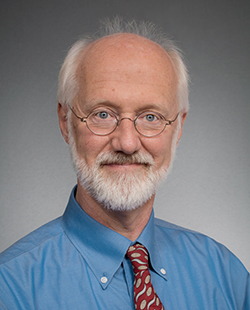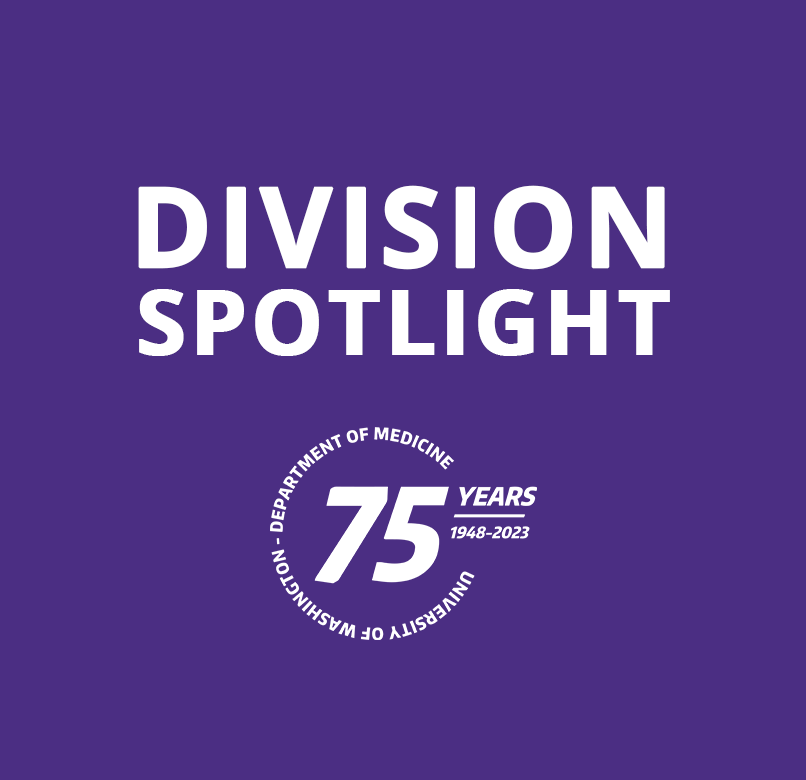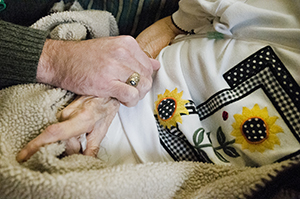


Division Spotlight: Gerontology and Geriatric Medicine
An expanding awareness of the special care needs of older patients became common in the United States and European medical systems in the years following World War II.
Celebrating 75 Years
As part of our 75th Anniversary, we plan to spotlight each of our divisions over the course of the year, in the order that they were established. Learn more about our 75th Anniversary on our website
At the University of Washington, a section of geriatrics developed organically among like-minded physicians in the Division of Endocrinology in the 1960s.
In 1977, the discipline of gerontology separated from the Division of Metabolism and Endocrinology, and the Division of Gerontology and Geriatric Medicine was established under the leadership of prominent endocrinologists, including Ed Bierman, Bill Hazzard, and Itamar Abrass.
The focal point of the new division was at Harborview Medical Center, with establishment of the SeniorCare Program in the 1980s. Later that decade, momentum built to establish geriatrics as a formal added qualification within internal medicine, followed by formal recognition as a subspecialty.
Special advanced training in fellowships began in the late 1980s and continues today, with our division training four fellows per year, whom we hope will be the next generation of leaders in geriatrics.
Education
The mission of our Geriatric Medicine Fellowship Program is to transform the care of older adults by training geriatricians who are exemplary clinicians, leaders, and innovators.
The Palliative Medicine Fellowship was developed in 2009 to meet the health care needs of an aging population and address severe and chronic illness affecting individuals of all ages.
Improving care for older adults through collaborative education
The University of Washington is one of 44 organizations around the country that has been awarded a Geriatrics Workforce Enhancement Program (GWEP) grant from the U.S. Department of Health & Human Services (HHS). The Northwest Geriatrics Workforce Enhancement Center (NW GWEC) is a collaboration of partner organizations across the state.
NW GWEC engages and trains primary care providers in geriatrics and Alzheimer’s disease and related dementias (ADRD) via case-based learning and support of practice-based quality improvement projects.
Clinical care
Senior care
The SeniorCare Program was initially conceived in 1976 by the UW Long Term Comprehensive Care Committee. In 1979, we began the outpatient clinic portion (now known as the Senior Care Clinic) and in 1980 the inpatient program (now known as Medicine G) was started.
The Senior Care Clinic provides primary and consultative care to older patients. Evaluation and management of health and cognitive concerns, physical exams, blood tests, immunizations, flu shots, foot care, illness prevention, one-on-one teaching about safety issues relevant to seniors, such as fall assessment and prevention.
Fall prevention
The Fall Prevention Clinic provides falls/mobility assessments and treatment planning to patients aged 65 and older, or younger patients, as needed. Our goals are to serve those who have not yet fallen, but may be at risk, and to manage care for those with a history of falls in order to prevent subsequent falls with serious injury.
UW Post-Acute Care Service
The UW Long Term Care Service started in 1990, and became the Post-Acute Care Service in 2005. We currently have 13 affiliated skilled nursing facilities as well as well as several home health partners to accommodate the various needs of patients discharged from all UW Medicine hospitals and the VA Puget Sound Health Care System.
Palliative care
 Palliative care provides an inter-professional team approach to supporting patients and their families facing serious illness.
Palliative care provides an inter-professional team approach to supporting patients and their families facing serious illness.
Our primary goal is to improve quality of life and relieve stress by addressing physical, emotional, psychological, social, spiritual and cultural needs while providing an extra layer of support and communication.
Research
Geriatrics at the VA
 Along with the development of geriatrics at Harborview, a strong geriatrics clinical and research initiative became a funded mandate within the VA Health Care System.
Along with the development of geriatrics at Harborview, a strong geriatrics clinical and research initiative became a funded mandate within the VA Health Care System.
The Geriatrics and Extended Care [GEC] Program, and the Geriatric Research Education and Clinical Center [GRECC] grew alongside the initiatives at Harborview, and the division grew at both sites.
The Seattle GRECC is now one of the most prominent research centers within the entire VA Health Care System.
Palliative medicine
Just as the geriatrics strength grew organically in the Endocrinology Division half a century ago, the palliative medicine strength at UW is, to a large extent, in the Geriatrics Division.
In the past decade, the hospice and palliative medicine movement has grown steadily and this has led to robust programs at all UW Medicine medical centers and the VA.
Palliative medicine crosses many specialties. No one owns it, and everyone owns it.
Several departments and divisions share the palliative medicine work, but much of the clinical, research, and educational initiatives are housed in the Geriatrics Division, including the palliative medicine fellowship program.
Insulin to treat dementia
Alzheimer’s disease and other, similar forms of dementia have become some of the most severe socioeconomic and medical burdens impacting modern society.
 We are part of a research group studying intranasal compounds to treat dementia. The group has made a promising discovery that insulin delivered high up in the nasal cavity goes to affected areas of brain with lasting results in improving memory.
We are part of a research group studying intranasal compounds to treat dementia. The group has made a promising discovery that insulin delivered high up in the nasal cavity goes to affected areas of brain with lasting results in improving memory.
Benefits of testosterone treatment in older men
The "Testosterone Trials", published in JAMA and JAMA Internal Medicine, reported the effects of testosterone treatment in older men (with low testosterone) on cognitive function, cardiovascular function, bone density and anemia.
Researchers found that testosterone treatments improved bone density and anemia, but did not improve patients' cognitive function, and it increased the amount of plaque buildup in the participants' coronary arteries.
Improving end-of-life care
We are measuring and evaluating interventions to improve the quality of medical care for seriously ill and dying patients. Research has shown that some lifesaving devices may prolong suffering without a clear benefit. Many patients and family members would like care to focus on comfort rather than on medical goals such as survival and organ function.
Treating veterans with traumatic brain injury
Researchers in a multicenter study being implemented in 20 VA Centers across the United States are testing the safety and efficacy of growth hormone replacement therapy to improve the quality of life of Veterans with traumatic brain injuries.